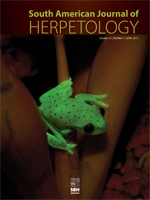A limiting factor in habitat selection is the presence of predators in the environment. Schooling behavior is one of the strategies that allows organisms to become established in specific habitats, even when predators are present. Although numerous reports about schooling behavior in tadpoles of Bufonidae exist, few experimental results on the subject are available. We conducted an experiment to study anti-predatory schooling behavior in tadpoles of Rhinella ornata. A subject (only one tadpole per experiment) got to choose among treatments with other tadpoles (promoting grouping), places with only water, places with dead tadpoles and dead dragonflies larvae chemical cues (simulating predators), and a mixture of all treatments. We found that individual tadpoles of R. ornata detected the chemical cues and tended to flee. The initial preference of escaping to places without aggregations of other tadpoles has not been reported for Bufonidae. Our results do not rule out schooling in R. ornata, but highlight the occurrence of an initial behavior under stressful predatory contexts.
How to translate text using browser tools
1 April 2017
Predation and Schooling Influence on the Primary Response of Individuals of Rhinella ornata (Spix, 1824) (Anura: Bunonidae): An Experimental Assessment of Habitat Selection
Juan Manuel Carvajalino Fernandez,
Mariana Zanotti Tavares de Oliveira
ACCESS THE FULL ARTICLE
aggregation
animal behavior
Experimental biology
frogs





